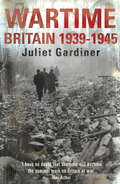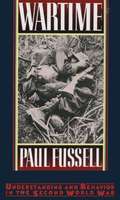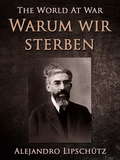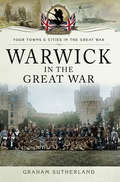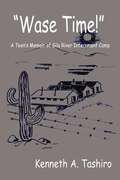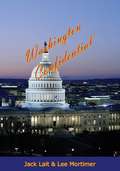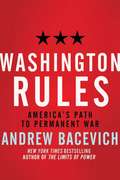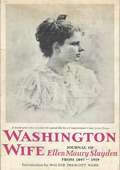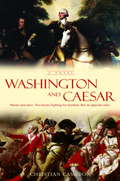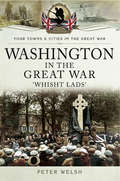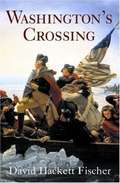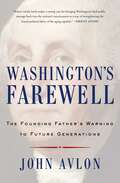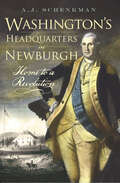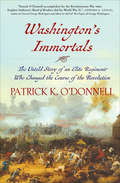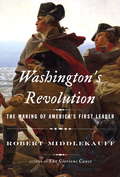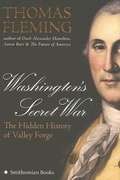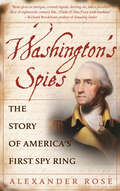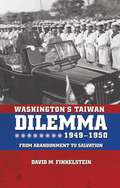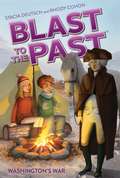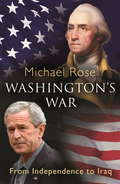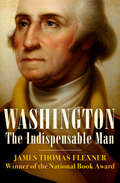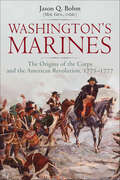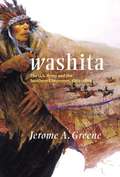- Table View
- List View
Wartime: Britain, 1939-1945
by Juliet GardinerJuliet Gardiner's critically acclaimed book - the first in a generation to tell the people's story of the Second World War - offers a compelling and comprehensive account of the pervasiveness of war on the Home Front. The book has been commended for its inclusion of many under-described aspects of the Home Front, and alongside familiar stories of food shortages, evacuation and the arrival of the GIs, are stories of Conscientious Objectors, persecuted Italians living in Britain and Lumber Jills working in the New Forest. Drawing on a multitude of sources, many previously unpublished, she tells the story of those six gruelling years in voices from the Orkney Islands to Cornwall, from the Houses of Parliament to the Nottinghamshire mines.
Wartime: Understanding and Behavior in the Second World War
by Paul FussellIn Wartime, Paul Fussell turns to the Second World War, the conflict in which he himself fought, to weave an intensely personal and wide-ranging narrative.
Warum wir sterben (The World At War)
by Alejandro LipschützEine philosophische Abhandlung über das Sterben
Warwick in the Great War (Your Towns & Cities in the Great War)
by Graham SutherlandWarwick in the Great War is a detailed account of how the experiences of war impacted on the garrison town from the outbreak of the Great War in 1914, to the long-awaited Armistice in 1918, and its immediate aftermath. The troops went off to war, cheered and supported by their friends and family, all in a high holiday mood, but underneath this jovial faade, their loved ones knew that some of the men would never return. Yet life went on, albeit with progressive and totally new experiences. As the war stagnated, Warwick`s citizens offered practical support for troops both at home and abroad. How did they cope with returning wounded troops, and where did they go? Tribunals decided who should be given exemption from military service: difficult decisions, especially when food economies and the conscription of farm labourers were involved. Rationing was inevitable, but how was it enforced? What happened after the Army Pay Corps moved to Warwick? And then there is the question of the treatment of Prisoners of War, both in Germany and at home.Using contemporary accounts, the author explores a little-known piece of Warwick`s history. Mainly looking at life on the home front, included are some extracts from the letters serving soldiers sent home, allowing these heroic men who lived through these momentous events, to tell their stories in their own words.
Wase Time!: A Teen's Memoir of Gila River Internment Camp
by Kenneth Tashiro"Wase Time!" is an autobiography of my teen age years in Gila River Internment Center, Arizona. I tell my story in the first person and I include much of the humor and conversation that was popular at that time. My story begins with the aftermath of Sunday, December 7, 1941. On Monday, the 8th, I was relieved of my 6th grade job raising the American flag. On March 28, 1942, my family and I moved to Del Rey, California, which was in the "Free Zone." In July, we were told all those of Japanese ancestry would have to leave California. On August 6, we were evacuated to Gila, except for my mom who was 8 months pregnant. Gila was a big center made up of two camps: camp 1 (Canal), and camp 2 (Butte). We lived briefly in Canal, then moved to Butte because of my dad's job. I made friends with my neighbors, and Hank introduced me to many youth who were from the French Camp/Stockton area. I became a member of the Ramblers, a team which played may sports, and we won the championship of the Southwestern Football League in 1943-44. Other happy memories were my mom and sister's arrival from Fresno Assembly Center, movie night, the warehouse gang, the Boy Scouts, and my getting a response to a fan letter that I wrote to Maureen O'Hara. Sad memories include Hank's departure to Tule Lake Relocation Center, my being called a "nigger," and what I did with the letter and photos of Maureen O'Hara. On March 28, 1945, my grandfather and I left Gila to go to Chicago, Illinois, to visit relatives. I was send out of camp for being an unsavory character, according to my mom. On the train ride, I thought of all my experiences in camp. Was being in camp "wase time"?
Washington Confidential
by Jack Lait Lee MortimerScandalous, shocking, cheeky, impudent are words that will be used to describe this account of the hidden side of our glamorous, riotous capital city.For Lait and Mortimer, famous newspapermen, mince no words, pull no punches, tell their story in their own bold way. They have found out the truth and they tell the facts and name the names—which no one dared write or publish before. They deglamorize Washington and reveal it with its spats off and its morning coat unbuttoned. They tear the Velvet Curtain and show the behind-the-scenes intrigue, the sub-rosa night life, the shady side of sex, the sin side, the crime side. The amazing things they report will shock millions, arouse citizens all over the country as their previous book Chicago Confidential did…“P-S-S-S-T!“Here we go again—Confidential.“We turned New York inside out; but we both live there. We turned Chicago upside down; but we were both raised there. We descended on Washington not quite like Stanley invaded Africa, because in our combined 75 years of newspaper work we had been in the capital hundreds of times. It intrigued us because we never could understand it. So we decided brashly to do a Lait-Mortimer operation on it from scratch. Our principal discovery was that nobody understands Washington—the city, not the nation’s nerve-center.[…]“That’s why we were born—to tell you what you couldn’t find out without us—Confidential!”—Jack Lait and Lee Mortimer
Washington Rules: America's Path to Permanent War
by Andrew J. BacevichThe bestselling author of The Limits of Power critically examines the Washington consensus on national security and why it must change. For the last half century, as administrations have come and gone, the fundamental assumptions about America's military policy have remained unchanged: American security requires the United States (and us alone) to maintain a permanent armed presence around the globe, to prepare our forces for military operations in far-flung regions, and to be ready to intervene anywhere at any time. In the Obama era, just as in the Bush years, these beliefs remain unquestioned gospel. In a vivid, incisive analysis, Andrew J. Bacevich succinctly presents the origins of this consensus, forged at a moment when American power was at its height. He exposes the preconceptions, biases, and habits that underlie our pervasive faith in military might, especially the notion that overwhelming superiority will oblige others to accommodate America's needs and desires; whether for cheap oil, cheap credit, or cheap consumer goods. And he challenges the usefulness of our militarism as it has become both unaffordable and increasingly dangerous. Though our politicians deny it, American global might is faltering. This is the moment, Bacevich argues, to reconsider the principles which shape American policy in the world; to acknowledge that fixing Afghanistan should not take precedence over fixing Detroit. Replacing this Washington consensus is crucial to America's future, and may yet offer the key to the country's salvation.
Washington Wife: Journal of Ellen Maury Slayden from 1897-1919
by Ellen Maury SlaydenThis unique account, written by the wife of a Congressman from Texas and just brought to light, is a tart, lively, and enormously diverting firsthand report about people and events in a fascinating period of American history.In 1897 Ellen Maury Slayden accompanied her newly elected Congressman husband to Washington. James Luther Slayden served as a member of the House of Representatives for the next twenty-two years. His wife, an inveterate diarist, a discerning and socially aware woman, made a record of the social, political, and historical events of her time.Beginning with the drafty, inept receptions of the McKinleys, she has re-created official White House entertaining under four Presidents, as well as lavish embassy parties, salon soirees, and intimate dinners with Congressional friends and many famous people outside political circles. But Ellen Slayden's interests were not limited to the social scene. She was involved in the woman's suffrage movement, and both she and her husband gave much of their lives to the cause of international peace.There also were trips back to Texas every year, sometimes for campaigning, which afford a rich lore of Texas humor. Mrs. Slayden writes movingly about a Confederate reunion, waspishly about Woodrow Wilson's pedagogical approach to the Presidency, and disparagingly about Prohibition. She re-creates political conventions, dramatic sessions of Congress, and the climate of Washington during wars and threats of war.In his introduction, Walter Prescott Webb, the distinguished historian, says:"Washington Wife is among the best contemporaneous records of the period between the Spanish-American War—which announced that the United States was a world power—and World War I, which defined the duties and fixed the cost of holding first place."
Washington and Caesar
by Christian CameronInspired by a little-known historical fact--that American slaves fought alongside the British in the Revolutionary War--this epic novel tells of a Mount Vernon slave who joins a Loyalist black regiment charged with defeating his former master on the battlefield. The year is 1773. A new slave arrives at George Washington's Virginia estate and is given the name Caesar. But the war for independence will soon bring a turn of events neither master nor slave could have predicted. Within months they will be fighting on opposite sides: Washington as commander of the Continental Army, Caesar as a soldier in the legendary Loyalist corps made up of former slaves. In this captivating tour de force brimming with spectacular battle scenes and gripping historical detail, Caesar's perilous rise through the British ranks is deftly interwoven with the story of Washington's war years, leading to the day when they come face-to-face again--this time in uniform. "From the Hardcover edition. "
Washington and Caesar
by Christian CameronInspired by a little-known historical fact--that American slaves fought alongside the British in the Revolutionary War--this epic novel tells of a Mount Vernon slave who joins a Loyalist black regiment charged with defeating his former master on the battlefield.The year is 1773. A new slave arrives at George Washington's Virginia estate and is given the name Caesar. But the war for independence will soon bring a turn of events neither master nor slave could have predicted. Within months they will be fighting on opposite sides: Washington as commander of the Continental Army, Caesar as a soldier in the legendary Loyalist corps made up of former slaves. In this captivating tour de force brimming with spectacular battle scenes and gripping historical detail, Caesar's perilous rise through the British ranks is deftly interwoven with the story of Washington's war years, leading to the day when they come face-to-face again--this time in uniform.From the Hardcover edition.
Washington in the Great War: 'Whisht Lads' (Your Towns & Cities in the Great War)
by Peter WelshHow the experience of war impacted on the town, from the initial enthusiasm for sorting out the German Kaiser in time for Christmas 1914, to the gradual realization of the enormity of human sacrifice the families of Washington were committed to as the war stretched out over the next four years. A record of the growing disillusion of the people, their tragedies and hardships and a determination to see it through. The Great War affected everyone. At home there were wounded soldiers in military hospitals, refugees from Belgium and later on German prisoners of war. There were food and fuel shortages and disruption to schooling. The role of women changed dramatically and they undertook a variety of work undreamed of in peacetime. Meanwhile, men serving in the armed forces were scattered far and wide. Extracts from contemporary letters reveal their heroism and give insights into what it was like under battle conditions.
Washington's Crossing
by David Hackett FischerSix months after the Declaration of Independence, the American Revolution was all but lost. A powerful British force had routed the Americans at New York, occupied three colonies, and advanced within sight of Philadelphia.<P><P> Yet, as David Hackett Fischer recounts in this riveting history, George Washington--and many other Americans--refused to let the Revolution die. On Christmas night, as a howling nor'easter struck the Delaware Valley, he led his men across the river and attacked the exhausted Hessian garrison at Trenton, killing or capturing nearly a thousand men. A second battle of Trenton followed within days. The Americans held off a counterattack by Lord Cornwallis's best troops, then were almost trapped by the British force. Under cover of night, Washington's men stole behind the enemy and struck them again, defeating a brigade at Princeton. The British were badly shaken. In twelve weeks of winter fighting, their army suffered severe damage, their hold on New Jersey was broken, and their strategy was ruined.<P> Fischer's richly textured narrative reveals the crucial role of contingency in these events. We see how the campaign unfolded in a sequence of difficult choices by many actors, from generals to civilians, on both sides. While British and German forces remained rigid and hierarchical, Americans evolved an open and flexible system that was fundamental to their success. The startling success of Washington and his compatriots not only saved the faltering American Revolution, but helped to give it new meaning.<P> Pulitzer Prize Winner
Washington's Farewell: The Founding Father's Warning to Future Generations
by John Avlon“A vivid portrait…A thoughtful consideration of Washington’s wisdom that couldn’t be timelier.” —Kirkus Reviews (starred review) George Washington’s Farewell Address was a prophetic letter from a “parting friend” to his fellow citizens about the forces he feared could destroy our democracy: hyper-partisanship, excessive debt, and foreign wars.Once celebrated as civic scripture, more widely reprinted than the Declaration of Independence, the Farewell Address is now almost forgotten. Its message remains starkly relevant. In Washington’s Farewell, John Avlon offers a stunning portrait of our first president and his battle to save America from self-destruction. At the end of his second term, Washington surprised Americans by publishing his Farewell message in a newspaper. The President called for unity among “citizens by birth or choice,” advocated moderation, defended religious pluralism, proposed a foreign policy of independence (not isolation), and proposed that education is essential to democracy. He established the precedent for the peaceful transfer of power. Washington’s urgent message was adopted by Jefferson after years of opposition and quoted by Lincoln in defense of the Union. Woodrow Wilson invoked it for nation-building; Eisenhower for Cold War; Reagan for religion. Now the Farewell Address may inspire a new generation to re-center our politics and reunite our nation through the lessons rooted in Washington’s experience. As John Avlon describes the perilous state of the new nation that Washington was preparing to leave as its leader, with enduring wisdom, he reveals him to be the indispensable Founding Father.
Washington's Headquarters in Newburgh: Home to a Revolution (Landmarks Ser.)
by A J SchneckmanWe know that Widow Hasbrouck opened her home to Washington in 1782, but the Hasbrouck family history itself has been distorted over the years by myths and legends. Much like the story of Washington chopping down the cherry tree, legend has it that the Hasbroucks and Washington would take a daily sojourn to the family orchards, where Jonathan Hasbrouck would first taste the general's fruit to ensure it was not poisoned. The truth is that Jonathan and Washington never met. In this revealing book, A.J. Schenkman finally dispels the rumors and relates the history of a prominent Newburgh family whose homestead ultimately became the nation's first publicly owned historic site in 1850.
Washington's Immortals: The Untold Story of an Elite Regiment Who Changed the Course of the Revolution
by Patrick K. O'DonnellBy the award-winning author of Dog Company: a historic account of a Revolutionary War unit’s “tactical acumen and human drama . . . combat writing at its best” (The Wall Street Journal). In August 1776, little over a month after the Continental Congress had formally declared independence from Britain, the revolution was on the verge of a disastrous end. General George Washington found his troops outmanned and outmaneuvered at the Battle of Brooklyn. But thanks to a series of desperate charges by a single heroic regiment, famously known as the “Immortal 400,” Washington was able to evacuate his men and the nascent Continental Army lived to fight another day. In Washington’s Immortals, award-winning military historian Patrick K. O’Donnell brings to life the forgotten story of these remarkable men. Comprised of rich merchants, tradesmen, and free blacks, they fought not just in Brooklyn, but in key battles including Trenton, Princeton, Camden, Cowpens, Guilford Courthouse, and Yorktown, where their heroism changed the course of the war. Drawing on extensive original sources, from letters to diaries to pension applications, O’Donnell pieces together the stories of these brave men—their friendships, loves, defeats, and triumphs. He explores their tactics, their struggles with hostile loyalists and shortages of clothing and food, their development into an elite unit, and their dogged opponents, including British General Lord Cornwallis. Through the prism of this one unit, O’Donnell tells the larger story of the Revolutionary War. “Well-written, and superbly researched . . . A must-read for Revolutionary War and Maryland history buffs alike.” —Bill Hughes, Baltimore Post-Examiner
Washington's Revolution
by Robert MiddlekauffA vivid, insightful, essential new account of the formative years that shaped a callow George Washington into an extraordinary leader, from the Bancroft Prize winner and Pulitzer Prize finalist Robert Middlekauff.George Washington was famously unknowable, a man of deep passions hidden behind a facade of rigid self-control. Yet before he was a great general and president, Washington was a young man prone to peevishness and a volcanic temper. His greatness as a leader evolved over time, the product of experience and maturity but also a willed effort to restrain his wilder impulses.Focusing on Washington's early years, Robert Middlekauff penetrates his mystique, revealing his all-too-human fears, values, and passions. Rich in psychological detail regarding Washington's temperament, idiosyncrasies, and experiences, this book shows a self-conscious Washington who grew in confidence and experience as a young soldier, businessman, and Virginia gentleman, and who was transformed into a patriot by the revolutionary ferment of the 1760s and '70s. Taking command of an army in constant dire need--of adequate food, weapons, and, at times, even clothing and shoes--Washington displayed incredible persistence and resourcefulness, growing into a leader who both understood and defined the crucial role of the army in the formation of a new American society.Middlekauff makes clear that Washington was at the heart of not just the revolution's course and outcome but also the success of the nation it produced. This is an indispensable book for truly understanding one of America's great figures.From the Hardcover edition.
Washington's Secret War: The Hidden History of Valley Forge
by Thomas FlemingThe secret war of the title was Washington's fight--while staving off the collapse of his army at Valley Forge--to identify and outmaneuver the political enemies who thought it was time to replace him with a more reliable and experienced general. Fleming, a longtime scholar of the Revolutionary War, thought he would be writing about the stubborn endurance of the American soldiers that winter. Instead he gleaned from his research a more personal story, revealing a new side of Washington--usually portrayed as a man who transcended politics: "He was a good politician in every sense of the word....He had to out think the conspirators who sought to destroy him and persuade others to out vote the congressional ideologues whose wrongheaded policies were the source of the Continental Army's woes." Annotation ©2006 Book News, Inc., Portland, OR (booknews.com)
Washington's Spies: The Story of America's First Spy Ring
by Alexander Rose<P>Basing his tale on remarkable original research, historian Alexander Rose reveals the unforgettable story of the spy ring that helped America win the Revolutionary War. For the first time, Rose takes us beyond the battlefront and into the shadowy underworld of double agents and triple crosses, covert operations and code breaking, and unmasks the courageous, flawed individuals who inhabited this wilderness of mirrors--including the spymaster at the heart of it all, George Washington. <P><b>A New York Times Bestseller</b>
Washington's Taiwan Dilemma, 1949-1950
by David FinkelsteinThe declaration of the People's Republic of China in October 1949 presented American foreign policy officials with two dilemmas: how to deal with the communist government on the mainland and what to do about Chiang Kai-shek's holdout Nationalist regime on Taiwan. By early 1950 these questions were pressing hard upon U.S. civilian and military planners and policy makers, for it appeared that the Red Army was preparing to invade the island. Most observers believed that nothing short of American military intervention would preclude a communist victory on Taiwan. How U.S. officials grappled with the question of what to do about Taiwan is at the heart of this study.Prior to the publication of this book, much of the historical literature on this critical period in U.S. policy toward China concentrated on the question of relations with the new regime in Beijing. A focus on those debates has largely overshadowed the concomitant policy debates that centered around the question of how to deal with the Nationalist regime on Taiwan. As this study shows, the two issues were inextricably linked and developing a Taiwan policy was no less difficult or controversial. Heavily informed by an analysis of declassified U.S. government documents and other primary sources, this history strongly suggests that had North Korea not invaded the south in June 1950 the U.S. would not have intervened to save Chiang Kai-shek and Taiwan from near-certain invasion.Beyond the narrative itself, this volume is also a case study into the complex and sometimes messy processes by which foreign policy is made. It explores the tensions that existed within the Truman administration between the State Department and various newly-created entities such as the Department of Defense, the Joint Chiefs of Staff, and the National Security Council. Indeed, the history of policymaking for China and Taiwan in 1949-50 is also a case study in the early development of the post-war interagency system. It also underscores the tensions between the Executive and Legislative branches in the development of foreign policy.The study also brings to light little-discussed and often uncomfortable issues in Taiwan history, some of which still have relevance to politics on the island even today. These include the legacies of the Japanese colonial experience, the post-war Nationalist occupation, and the early stirrings of the "Formosan" independence movement, to name just a couple.Today, U.S. policy toward Taiwan remains a highly-charged and fundamentally divisive issue in U.S.-China relations - especially the security dimensions of that policy. And even today U.S. Taiwan policy is still subject to partisan politics in Washington as well as in Taipei. For those who still grapple with this issue, this volume presents the roots of the dilemma and essential background reading.
Washington's War (Blast to the Past #7)
by Stacia Deutsch Rhody Cohon Guy FrancisKeep history on track--that's an order! Abigail and her friends have an important job today: They must convince George Washington to stay in Valley Forge and continue to fight the Revolutionary War. The future of America depends on him! Turns out, General Washington is superstubborn. No matter what the kids say, or where they take him, they can't get him to change his mind. Will Abigail and the boys succeed, or will the father of our country become just a blip in history?
Washington's War: From Independence To Iraq
by General Sir Michael Rose KCB CBE DSO OGMThe story of how George Washington beat the British out of America - and how Iraqi insurgents are now using the same tactics to push the Americans out of IraqIn 1775, George Washington took command of a ragbag army of American insurgents and took on the might of the British Army. Through a brilliant campaign of ambush and indirect attacks, he finally succeeded in defeating the greatest military power in the world, and won America its independence.Today it is the USA that is the world's dominant superpower. When they entered Iraq in 2003 they made the same mistakes that the British made over 200 years ago: they underestimated the popular hostility against them, and believed they could fight a widespread insurgence using troops trained for conventional warfare. They are beginning to learn, as the British did, that sheer military power is not enough.As a former Director of UK Special Forces and Commander of the United Nations Protection Force in Bosnia, Michael Rose is uniquely experienced in counter-insurgency warfare. In this hard-hitting book he explains the principles of guerrilla warfare as used in the American War of Independence, and shows how those same principles have been adopted by the insurgents in Iraq.
Washington's War: From Independence To Iraq
by Michael RoseThe story of how George Washington beat the British out of America - and how Iraqi insurgents are now using the same tactics to push the Americans out of IraqIn 1775, George Washington took command of a ragbag army of American insurgents and took on the might of the British Army. Through a brilliant campaign of ambush and indirect attacks, he finally succeeded in defeating the greatest military power in the world, and won America its independence.Today it is the USA that is the world's dominant superpower. When they entered Iraq in 2003 they made the same mistakes that the British made over 200 years ago: they underestimated the popular hostility against them, and believed they could fight a widespread insurgence using troops trained for conventional warfare. They are beginning to learn, as the British did, that sheer military power is not enough.As a former Director of UK Special Forces and Commander of the United Nations Protection Force in Bosnia, Michael Rose is uniquely experienced in counter-insurgency warfare. In this hard-hitting book he explains the principles of guerrilla warfare as used in the American War of Independence, and shows how those same principles have been adopted by the insurgents in Iraq.
Washington: The Indispensable Man (The\illustrated Editions Ser.)
by James Thomas FlexnerThis &“perceptive&” and &“satisfying&” biography of George Washington by an award-winning historian &“deserves a place on every American&’s bookshelf&” (The New York Times Book Review). James Thomas Flexner&’s masterful four-volume biography of America&’s first president, which received a special Pulitzer Prize citation and a National Book Award for its concluding installment, is the definitive chronicle of Washington&’s life and a classic work of American history. In this single-volume edition, Flexner brilliantly distills his sweeping study to offer readers &“the most convincing evocation of the man and his deeds written within the compass of one book&” (Los Angeles Times). In graceful and dramatic prose, Flexner peels back the myths surrounding Washington to reveal the true complexity of his character. The only founding father from Virginia to free all his slaves, Washington was a faithful husband who harbored deep romantic feelings for his best friend&’s wife. An amateur soldier, he prepared for his role as commander in chief of the Continental army by sending out to Philadelphia bookshops for treatises on military strategy. As president, he set many democratic precedents—including the two-term limit and the appointment of an advisory cabinet—yet routinely excluded his vice president, John Adams, from important decisions. The George Washington that emerges in these pages is a shrewd statesman, a wise commander, a brave patriot, and above all, &“an ordinary man pushed to greatness by the extraordinary times in which he lived&” (The Christian Science Monitor). In tracing Washington&’s evolution from privileged son of the landed gentry to &“the indispensable man&” without whom the United States as we know it would not exist, Flexner presents a hero worthy of admiration not only for his remarkable strengths, but also for his all-too-human weaknesses.
Washington’s Marines: The Origins of the Corps and the American Revolution, 1775–1777
by Jason Q. BohmA history of the US Marine Corps’ beginnings during the American Revolution.Winner, 2024 Fraunces Tavern Museum Book Award“Bohm has given us an excellent and useful book on the important contribution of Continental Marines and state Marines in pivotal campaigns of the American Revolutionary War.”—Dr. David Hackett Fischer, acclaimed author of Washington’s Crossing, Albion’s Seed, The Great Wave, and Paul Revere’s RideThe fighting prowess of United States Marines is second to none, but few know of the Corps’ humble beginnings and what it achieved during the early years of the American Revolution. Jason Bohm rectifies this oversight with his eye-opening Washington’s Marines: The Origins of the Corps and the American Revolution, 1775–1777.The story begins with the oppressive days that drove America into a conflict for which it was ill-prepared, when thirteen independent colonies commenced a war against the world’s most powerful military with nothing more than local militias, privateers, and other ad hoc units. The Continental Congress rushed to form an army and placed George Washington in command, but soon realized that, to win its freedom, America would need men who could fight on the sea and on land. Enter the Marines. Bohm artfully tells the story of the creation of the Continental Marines and the men who led them during the parallel paths followed by the Army and Marines in the opening years of the war and through the early successes and failures at Lexington and Concord, Bunker Hill, Canada, Boston, Charleston, and more.As General Washington struggled to preserve his command after defeats in New York and New Jersey in 1776, the nascent U.S. Navy and Marines deployed the first American fleet, conducted their first amphibious operation, and waged a war on the rivers and seas to block British reinforcements and capture critically needed supplies. Desperate times forced Congress to detach the Continental Marines from the Navy to join the embattled army as Washington sought an “important stroke” to defeat his adversary.Washington’s Marines joined their fellow soldiers in a protracted land campaign that culminated in turning-point victories at Trenton, Assunpink Creek, and Princeton. This chapter of the Continental Marines ends in Morristown, New Jersey, when Washington granted Henry Knox’s request to leverage the Marines’ expertise with naval guns to fill the depleted ranks of the army’s artillery during the “Forage War.”Washington’s Marines is the first complete study of its kind to weave the men, strategy, performance, and personalities of the Corps’ formative early years into a single compelling account. The sweeping prose relies heavily on primary research and the author’s own extensive military knowledge. Enhanced with original maps and illustrations, Washington’s Marines will take its place as one of the finest studies of its kind.
Washita: The U.S. Army and the Southern Cheyennes, 1867-1869
by Jerome A. GreeneOn November 27, 1868, the U.S. Seventh Cavalry under Lt. Col. George Armstrong Custer attacked a Southern Cheyenne village along the Washita River in present-day western Oklahoma. In this remarkably balanced history, Greene describes the event's causes, conduct, and consequences and the multiple controversies surrounding the conflict.
